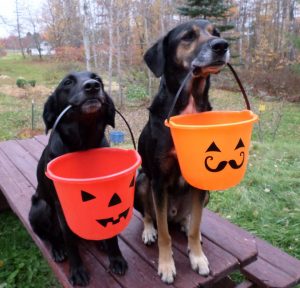Guest blog by the LSU School of Veterinary Medicine
Halloween can be a fun, family time, but please remember to watch out for your four-legged family members. A number of items related to Halloween can be hazardous to your pets:
Chocolate is popular with people, but your dog is attracted to it as well. Chocolate is toxic to dogs, and the darker the chocolate, the more dangerous it is. If you think your dog may have ingested chocolate, signs to watch for include vomiting, diarrhea, lethargy, agitation, increased thirst, an elevated heart rate and in severe cases, seizures.
Raisins can be just as toxic to dogs as chocolate and can cause kidney failure if even small amounts are ingested. Signs of raisin or grape poisoning include vomiting, nausea, decreased appetite, lethargy, abdominal pain, excessive or decreased thirst and urination, bad breath and rapid onset kidney failure.

Keeping it safe: Calypso, Chase, Chrome, Maverick and Stormy enjoy the pumpkin patch. Photo: Lynn Broderick
If your dog ingests large amounts of any candy, it can be harmful and lead to pancreatitis, which is potentially fatal. Pancreatitis is inflammation of the pancreas and is very painful. Pet owners should be aware that clinical signs of pancreatitis may not present for several days after ingestion. Signs include a decreased appetite, vomiting, diarrhea, lethargy, abdominal pain and potentially, kidney or organ damage.
Other Halloween hazards include candy wrappers and small toys. These can cause bowel obstruction that may require surgery. Watch for vomiting, decreased appetite, not defecating, straining to defecate, or lethargy. X-rays or even ultrasound may be necessary to diagnose this problem.
You may want your pet to join in the fun and dress up for Halloween. If so, please make sure that the costume does not impair your pet’s vision, hearing, movement or air intake and that it does not have small pieces that could be broken off and ingested. Before dying or coloring your pet’s fur, please consult your veterinarian, as some products can be harmful to pets even if they will not harm people.

Pet Halloween costumes should not impair your pet’s vision, hearing, movement or air intake. Photo: Marie Nolan
If your pet becomes sick or if you think that it may have ingested something harmful, contact your veterinarian immediately. Delays in seeking veterinary help may seriously complicate the problem. You can also contact the Pet Poison Helpline, an animal poison control center based out of Minneapolis, at 800-213-6680. The helpline is available 24 hours, seven days a week for pet owners and veterinary professionals that require assistance treating a potentially poisoned pet. The Pet Poison Helpline’s fee of $39 per incident includes follow-up consultation for the duration of the poison case.
You can also contact the ASPCA for animal poison-related emergencies, 24 hours a day, 365 days a year, 888-426-4435. A $65 consultation fee may be applied to your credit card.
Please help make this a safe and happy holiday season for all of the members of your family!






